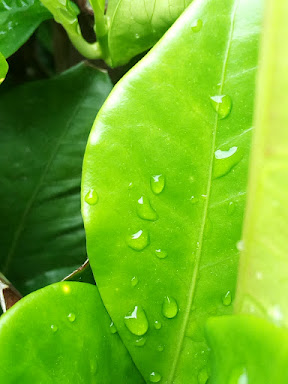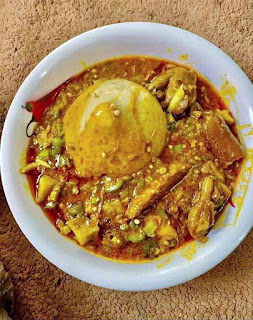What to expect;
How to prepare
- okro soup
- okro stew
- fetri toto
Preparing okro soupThe ingredients needed are:
- fresh okro
- onion
- garlic
- ginger
- salt
- meat or fish (any kind)
- pepper
- lapipi (momone)
- paml oil (optional)
- salt petre
- garden egg
The content of okro soup differs from place to place due to the ingredients used and even the procedure depending on who is preparing it. Preparing okro soup is an interesting process to look at and learn a few things which will be shown here.
Wash onion, garlic, ginger, pepper and grind.
Note that in preparing okro soup, tomato is not used mostly to ensure the slime is not removed from the soup.
Fresh okro and garden egg is washed nicely and cut into very small pieces with some sliced onions. The garden egg is cut longitudinally so that it is like long stripes. Water is put on fire and the lapipi (Ewe and also known in Twi as momone ) is put into the water and allowed to boil.
[This lapipi or momone is just a fish prepared in a special way for use in preparing soups and stews. The kind of fish used are normally big and they are kept in a sack and buried in the ground for some days. The fish after undergoing this process now picks up some flavour and makes it taste nice in soups and stews. It is also known to have a very salty taste for which reason when it is used, the addition of salt to the soup or the stew has to be very minimal.]
When the water boils, the okro is poured into it, and ground pepper is also added. Salt and maggi are also added. Even spices can be added to improve the flavor. Salt petre is also added to make the okro soft on time and it also increases the slime which is a characteristic feature of the soup. After some minutes, the fish is added and likewise, palm oil but the addition of palm oil is an option but not so necessary. The soup is allowed to cook well and then it can be served with banku or akple. In a summarized way, this is how okro soup is prepared and everyone who wants to try this Ghanaian soup can just follow these few procedures and have something great to enjoy.
Okro stew
The name is okro stew because this one is prepared to be like a stew.
The same ingredients as used for the okro soup are used but with this, tomato is used in that it is used to prepare the stew.
The ground pepper and the tomato are used to prepare first a stew using palm oil and the fish or meat added. The 'momone' is also placed in the stew since it is one essential ingredient found in most indigenous soups and stews.
The cut okro is boiled separately with just a reasonable amount of water and then added to the stew. It is now allowed to simmer very well. The garden egg in this case is cut into smaller pieces but way bigger than the okro and also boiled together with the okro before added to the stew. This way, this stew has a special taste and comparing this to okro soup, the okro stew is more delicious than the soup. The only reason why it isn't prepared always is the amount of time to be dedicated to it whilst the soup can be prepared in a matter of few minutes.
Fetri toto
The word 'Toto' is an Ewe word which means to pound. This is how it is done.
After cutting of the cap and tail of okro, it is put in water and boiled. After is has boiled and becomes soft enough, it is removed and poured into an a bowl which normally is an earthenware bowl used traditionally for grinding pepper. The tampoline is used to pound the boiled okro into reduces stripes and then poured back into the water. The ground pepper and the other necessary ingredients are added.
This kind of okro soup is mostly done when a person wants just some soup to eat without necessarily concerned about the richness but this kind also tastes very great.











Comments
Post a Comment
Share your views on this insightful content